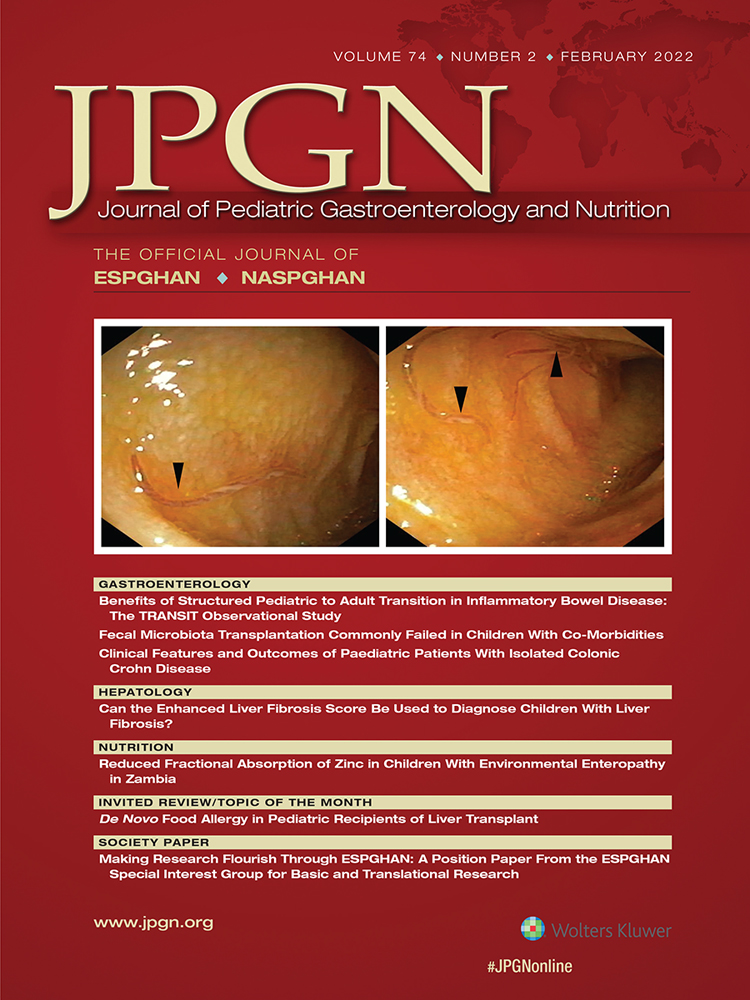Fecal Microbiota Transplantation Commonly Failed in Children With Co-Morbidities
Sources of Funding: This work was supported by Gutsy Kids Fund led by the Brock Wagner family, including philanthropic donations from the Klaasmeyer, Frugoni and other generous families. We are also grateful to the Houston Men of Distinction for their generous support. Additional funds including T32 DK007664-24S1, R01-AI10091401, DK096323, P30-DK56338, P01-AI152999, and U01-AI24290 obtained from the National Institutes of Health.
Conflicts of Interest: These authors disclose the following: T.C.S. received research funding from Merck, Nivalis, Cubist, Mead Johnson, Rebiotix, BioFire, Assembly BioSciences, and has served on the advisory board for Rebiotix and BioFire. R.J.S. provided consultancy for Nutrinia, IMHealth, and Biogaia AB, and received restricted research support from Mead-Johnson; J.V. received unrestricted research support from Biogaia AB (Stockholm, Sweden) and serves on the Scientific Advisory Boards of Biomica, Plexus Worldwide, and Seed Health; no study sponsors were involved in the design of the study, collection, analysis, or interpretation of the data, or the writing of the manuscript. The remaining authors disclose no conflicts.
Supplemental digital content is available for this article. Direct URL citations appear in the printed text, and links to the digital files are provided in the HTML text of this article on the journal's Web site (www.jpgn.org).
ABSTRACT
Objectives:
Fecal microbiota transplantation (FMT) is arguably the most effective treatment for recurrent Clostridioides difficile infection (rCDI). Clinical reports on pediatric FMT have not systematically evaluated microbiome restoration in patients with co-morbidities. Here, we determined whether FMT recipient age and underlying co-morbidity influenced clinical outcomes and microbiome restoration when treated from shared fecal donor sources.
Methods:
Eighteen rCDI patients participating in a single-center, open-label prospective cohort study received fecal preparation from a self-designated (single case) or two universal donors. Twelve age-matched healthy children and four pediatric ulcerative colitis (UC) cases from an independent serial FMT trial, but with a shared fecal donor were examined as controls for microbiome restoration using 16S rRNA gene sequencing of longitudinal fecal specimens.
Results:
FMT was significantly more effective in rCDI recipients without underlying chronic co-morbidities where fecal microbiome composition in post-transplant responders was restored to levels of healthy children. Microbiome reconstitution was not associated with symptomatic resolution in some rCDI patients who had co-morbidities. Significant elevation in Bacteroidaceae, Bifidobacteriaceae, Lachnospiraceae, Ruminococcaceae, and Erysipelotrichaceae was consistently observed in pediatric rCDI responders, while Enterobacteriaceae decreased, correlating with augmented complex carbohydrate degradation capacity.
Conclusion:
Recipient background disease was a significant risk factor influencing FMT outcomes. Special attention should be taken when considering FMT for pediatric rCDI patients with underlying co-morbidities.




